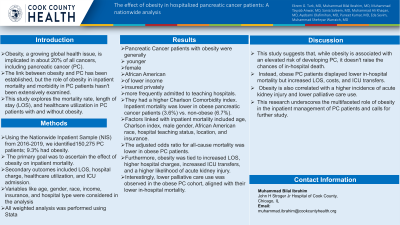Tuesday Poster Session
Category: Biliary/Pancreas
P2844 - The Effect of Obesity in Hospitalized Pancreatic Cancer Patients: A Nationwide Analysis
Tuesday, October 24, 2023
10:30 AM - 4:00 PM PT
Location: Exhibit Hall

Has Audio
.jpg)
Muhammad Bilal Ibrahim, MD
John H. Stroger, Jr. Hospital of Cook County
Chicago, IL
Presenting Author(s)
Ekrem G. Turk, MD1, Muhammad Bilal Ibrahim, MD1, Muhammad Tayyab Anwar, MD1, Sania Saleem, MD1, Muhammad Ali Khaqan, MD1, Ayobami Olafimihan, MD1, Puneet Kumar, MD1, Eda Sevim Boduroglu, 2, Muhammad Sheharyar Warraich, MD1
1John H. Stroger, Jr. Hospital of Cook County, Chicago, IL; 2Gazi University School of Medicine, Ankara, Ankara, Turkey
Introduction: Obesity, a growing global health issue, is implicated in about 20% of all cancers, including pancreatic cancer (PC). The link between obesity and PC has been established, but the role of obesity in inpatient mortality and morbidity in PC patients hasn't been extensively examined. This study explores the mortality rate, length of stay (LOS), and healthcare utilization in PC patients with and without obesity.
Methods: Using the Nationwide Inpatient Sample (NIS) from 2016-2019, we identified 150,275 PC patients; 9.3% had obesity. The primary goal was to ascertain the effect of obesity on inpatient mortality. Secondary outcomes included LOS, hospital charge, healthcare utilization, and ICU admission. Variables like age, gender, race, income, insurance, and hospital type were considered in the analysis.
Results: PC patients with obesity were generally younger, female, African American, of lower income, insured privately, and more frequently admitted to teaching hospitals. They had a higher Charlson Comorbidity index. Inpatient mortality was lower in obese PC patients (3.6%) vs. non-obese (6.7%). Factors linked with inpatient mortality included age, Charlson index, male gender, African American race, hospital teaching status, location, and insurance. The adjusted odds ratio for all-cause mortality was lower in obese PC patients. Furthermore, obesity was tied to increased LOS, higher hospital charges, increased ICU transfers, and a higher likelihood of acute kidney injury. Interestingly, lower palliative care use was observed in the obese PC cohort, aligned with their lower in-hospital mortality.
Discussion: This study suggests that, while obesity is associated with an elevated risk of developing PC, it doesn't raise the chances of in-hospital death. Instead, obese PC patients displayed lower in-hospital mortality but increased LOS, costs, and ICU transfers. Obesity is also correlated with a higher incidence of acute kidney injury and lower palliative care use. This research underscores the multifaceted role of obesity in the inpatient management of PC patients and calls for further study.
Disclosures:
Ekrem G. Turk, MD1, Muhammad Bilal Ibrahim, MD1, Muhammad Tayyab Anwar, MD1, Sania Saleem, MD1, Muhammad Ali Khaqan, MD1, Ayobami Olafimihan, MD1, Puneet Kumar, MD1, Eda Sevim Boduroglu, 2, Muhammad Sheharyar Warraich, MD1. P2844 - The Effect of Obesity in Hospitalized Pancreatic Cancer Patients: A Nationwide Analysis, ACG 2023 Annual Scientific Meeting Abstracts. Vancouver, BC, Canada: American College of Gastroenterology.
1John H. Stroger, Jr. Hospital of Cook County, Chicago, IL; 2Gazi University School of Medicine, Ankara, Ankara, Turkey
Introduction: Obesity, a growing global health issue, is implicated in about 20% of all cancers, including pancreatic cancer (PC). The link between obesity and PC has been established, but the role of obesity in inpatient mortality and morbidity in PC patients hasn't been extensively examined. This study explores the mortality rate, length of stay (LOS), and healthcare utilization in PC patients with and without obesity.
Methods: Using the Nationwide Inpatient Sample (NIS) from 2016-2019, we identified 150,275 PC patients; 9.3% had obesity. The primary goal was to ascertain the effect of obesity on inpatient mortality. Secondary outcomes included LOS, hospital charge, healthcare utilization, and ICU admission. Variables like age, gender, race, income, insurance, and hospital type were considered in the analysis.
Results: PC patients with obesity were generally younger, female, African American, of lower income, insured privately, and more frequently admitted to teaching hospitals. They had a higher Charlson Comorbidity index. Inpatient mortality was lower in obese PC patients (3.6%) vs. non-obese (6.7%). Factors linked with inpatient mortality included age, Charlson index, male gender, African American race, hospital teaching status, location, and insurance. The adjusted odds ratio for all-cause mortality was lower in obese PC patients. Furthermore, obesity was tied to increased LOS, higher hospital charges, increased ICU transfers, and a higher likelihood of acute kidney injury. Interestingly, lower palliative care use was observed in the obese PC cohort, aligned with their lower in-hospital mortality.
Discussion: This study suggests that, while obesity is associated with an elevated risk of developing PC, it doesn't raise the chances of in-hospital death. Instead, obese PC patients displayed lower in-hospital mortality but increased LOS, costs, and ICU transfers. Obesity is also correlated with a higher incidence of acute kidney injury and lower palliative care use. This research underscores the multifaceted role of obesity in the inpatient management of PC patients and calls for further study.
Disclosures:
Ekrem Turk indicated no relevant financial relationships.
Muhammad Bilal Ibrahim indicated no relevant financial relationships.
Muhammad Tayyab Anwar indicated no relevant financial relationships.
Sania Saleem indicated no relevant financial relationships.
Muhammad Ali Khaqan indicated no relevant financial relationships.
Ayobami Olafimihan indicated no relevant financial relationships.
Puneet Kumar indicated no relevant financial relationships.
Eda Sevim Boduroglu indicated no relevant financial relationships.
Muhammad Sheharyar Warraich indicated no relevant financial relationships.
Ekrem G. Turk, MD1, Muhammad Bilal Ibrahim, MD1, Muhammad Tayyab Anwar, MD1, Sania Saleem, MD1, Muhammad Ali Khaqan, MD1, Ayobami Olafimihan, MD1, Puneet Kumar, MD1, Eda Sevim Boduroglu, 2, Muhammad Sheharyar Warraich, MD1. P2844 - The Effect of Obesity in Hospitalized Pancreatic Cancer Patients: A Nationwide Analysis, ACG 2023 Annual Scientific Meeting Abstracts. Vancouver, BC, Canada: American College of Gastroenterology.
